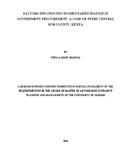| dc.description.abstract | Public procurement is increasingly being recognized as a vehicle to help governments achieve social
goals and sustainable economic development. The government procurement market often makes up 10
to 15 per cent of the GDP of developed countries and up to 30 to 40 per cent of the economies of
developing countries. In Kenya for example, the government spends approximately 70% of its budget on
procurement. Given the fact that governments are the largest buyers in any economy, government
procurement offers a unique, financially sustainable avenue to empower women and reduce poverty.
Public procurement as a tool to promote participation by women-owned businesses is therefore,
compelling from a developmental and economic perspective. Increasing opportunities for more small
and medium-sized enterprises (SMEs) to engage in the delivery of goods and services can result in
improved outcomes for alleviation of poverty and increasing gender equality, given that women-owned
businesses are disproportionately in this sub-sector of the economy. In this regard, governments
including Kenya have institutionalized different measures to increase access to government procurement
by different target groups, including women. However, despite the numerous opportunities available in
government procurement, few women effectively participate in this sizeable market. The main objective
of the study was to establish factors influencing women participation in government procurement in
Kenya. The specific objectives were to assess how economic, socio-cultural, governmental and technical
factors influence women participation in government procurement. Data was collected from 395 women
respondents from Nyeri Central Sub-County using self administered questionnaires; and interview
guides were used for procurement officers, WEF officers, Uwezo fund officers and AGPO officers. The
data was analysed with the aid of Statistical Package for Social Sciences (SPSS) computer software.
Qualitative data was analysed through content analysis, while quantitative data was analysed through
descriptive statistics. Data was presented in the forms of percentages and tables. The research
established that access to financial capital, price competition, Government contracts value, awareness,
social systems, legislation, capacity building programs, corruption, procurement requirements, tender
processes and bureaucracy individually and collectively affect participation of women in Government
procurement. However, the benefits that SMEs and women-owned businesses have to offer in terms of
enhancing government efficiency and productivity mean that we should act to surmount existing
challenges. Therefore the study recommended that the Government should consider lending to women
as individuals as opposed to groups; standardize and simplify the tender process and documentation;
increase training, sensitization and capacity building programs; as well as seal existing loopholes in
procurement legislations and policies. Women, on their part, should be more proactive, vigilant and alert
on existing rights and opportunities in Government procurement. | en_US |



